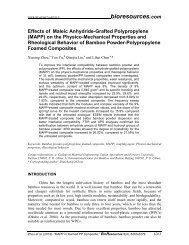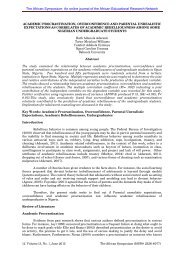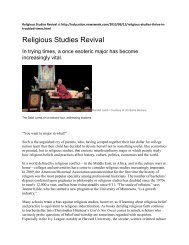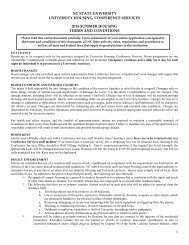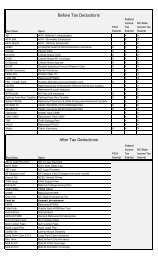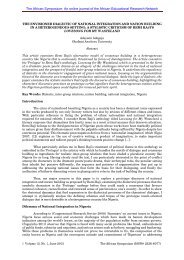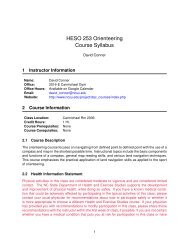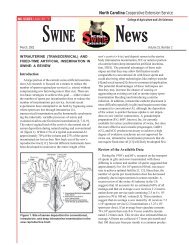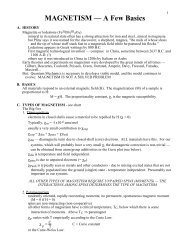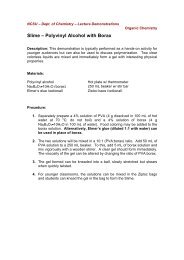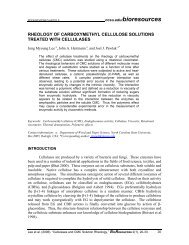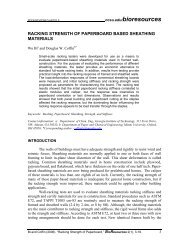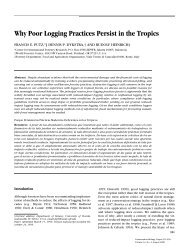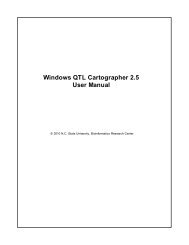Dictators, Songwriters, and the Negotiation of Censorship
Dictators, Songwriters, and the Negotiation of Censorship
Dictators, Songwriters, and the Negotiation of Censorship
You also want an ePaper? Increase the reach of your titles
YUMPU automatically turns print PDFs into web optimized ePapers that Google loves.
Wilson<br />
hysterical. In ano<strong>the</strong>r speech (<strong>of</strong> which <strong>the</strong>re were many), Massera warns<br />
his audience to beware <strong>of</strong> words. They are “unfaithful,” he says. “The only<br />
safe words are our words” (Feitlowitz 19). The regime enforced this policy<br />
with a cultural “blackout” (apagón), which, restricted many <strong>of</strong> <strong>the</strong> media<br />
<strong>and</strong> prohibited all meeting or exchange <strong>of</strong> ideas in public spaces.<br />
Fur<strong>the</strong>rmore, blacklisting or more direct intimidation toward actors,<br />
filmmakers, producers, technicians <strong>and</strong> writers shut down <strong>the</strong> media <strong>and</strong><br />
entertainment industries that were not <strong>of</strong>ficially prohibited. Part <strong>of</strong> <strong>the</strong><br />
terror was its ambiguity, its r<strong>and</strong>omness. One was always uncertain as to<br />
whe<strong>the</strong>r an act or word would provoke punishment, <strong>and</strong> whe<strong>the</strong>r that<br />
punishment would mean incarceration or death. “En todos mis recitales,”<br />
León Gieco recounts, “había un par de monos jóvenes que me decían<br />
‘acordate que no podés tocar “Hombres de hierro” ni “Sólo le pido a Dios”,<br />
estamos acá para recordártelo.’ Era una presión muy gr<strong>and</strong>e” (Finkelstein<br />
113). It was difficult for artists to know where <strong>the</strong>y stood, because <strong>the</strong>y<br />
might not really ever know for sure exactly which words were prohibited.<br />
The increasing aggression against language whittled away at artists’<br />
resources for writing, leaving fewer <strong>and</strong> fewer words for <strong>the</strong>m to convey<br />
<strong>the</strong>ir meaning. After <strong>the</strong> regime closed down <strong>the</strong> University <strong>of</strong> Luján, singer<br />
León Gieco put on a benefit show for <strong>the</strong> pr<strong>of</strong>essors <strong>the</strong>re, <strong>and</strong> performed<br />
“La cultura es la sonrisa” singing, “[s]ólo llora su tristeza si un ministro<br />
cierra una escuela ,” a line that provoked <strong>the</strong> ire <strong>of</strong> <strong>the</strong> generals.<br />
Un día me tocan el portero eléctrico y [un <strong>of</strong>icial] de guantes<br />
blancos me dice que un tal general Montes quiere hablar conmigo….<br />
Cu<strong>and</strong>o entré a la <strong>of</strong>icina del general Montes, iba a sentarme pero el<br />
tipo se quedó parado, sacó una pistola, me apuntó a la cabeza, y me<br />
dijo que nunca más vuelva a cantar esa canción porque si lo hacía<br />
me iba a pegar un balazo en la cabeza. Eso fue todo. Mientras iba<br />
para la puerta, el tipo me dice “Gieco, usted a mí no me conoce y no<br />
me vio nunca...”. Cu<strong>and</strong>o salí de ahí, el que me había venido a<br />
buscar a mi casa me empezó a dar consejos. Me dijo que no era<br />
conveniente que cantara “Sólo le pido a Dios” ni “La cultura es la<br />
sonrisa” y que cantar una canción de paz en tiempos de guerra era<br />
un acto de subversión. Estaba muy asustado…. La estr<strong>of</strong>a que me<br />
cuestionaban de “La cultura es la sonrisa” la saqué para siempre.<br />
(Rebelde)<br />
56



